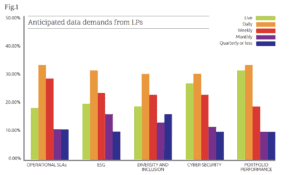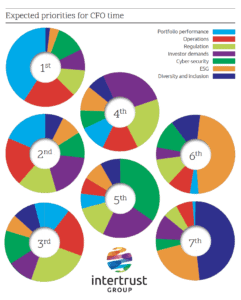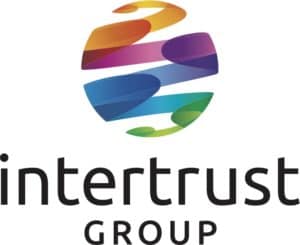Sponsored by Intertrust Group
Chief financial officers (CFOs) of private capital funds readily admit that they expect investor demands for enriched and more frequent data to intensify over the next few years. How they plan to meet these demands was one of the areas explored in a joint Intertrust Group and Global Custodian survey.
Participants were drawn from across the private capital fund spectrum, including private equity, private debt, infrastructure and real estate in the US, UK, China and Western Europe. Assets under management of respondents ranged from less than $1 billion to more than $50 billion. In a parallel survey, investors in private capital funds – mainly in US, UK and China – were surveyed to act as a check on whether CFO expectations are aligned with their clients.

Figure 1: Anticipated data demands from LPs
Survey results show CFOs gearing up to meet demands for real-time or quasi-real-time data about the status of their investments. Some 31% of respondents expect their investors to be looking for access to live updates on portfolio performance and 27% on cyber-security (See Figure 1). While some regional variation was evident, with CFOs in China most exercised in this regard, 64% of respondents expect to have to provide at the very least daily information on portfolio performance and 57% on cyber-security.
This is slightly higher than the expectations expressed by LPs themselves, of whom 63% say they are looking for either live or daily updates on portfolio performance and 54% on cyber-security. At the same time, 50% of CFO participants and 55% of investors are expecting a need for live or daily updates on operational SLAs.
With cyber-security a widespread con cern for any corporate or institution, the need to be kept fully informed on unexpected developments is understandable. Given the nature of private fund investments however – with varying liquidity profiles – are live updates on portfolio performance realistic?
“Those allocating money to private capital funds will often have had significant exposure to traded markets, where they are accustomed to high degrees of transparency,” says Chitra Baskar, chief operating officer and global head of funds and product at Intertrust Group. Coming from a mindset which is constantly looking at the data, they bring that investment culture to the private markets, where, she suggests, “the relative lack of information leaves them less comfortable than they would like”. In addition, as their allocation to private markets grows and they grapple with separately managed accounts, the need for more information increases. “When I see some of the survey respondents asking for live or daily updates, I think that should be read as a need for funds to demonstrate that they have their fingers on the pulse of the markets, if not on a daily basis, then at least on a much more periodic basis than at present,” she adds.
By contrast, CFOs appear to be over-estimating the need for frequent updates on environmental, social and corporate governance (ESG) and diversity and inclusion (D&I). Anecdotal evidence suggests that priorities in this regard may well shift over time. The relatively recent increase in the profiles of these two aspects of investment and organisation may account for their ranking in CFO expectations. Outcomes from ESG and D&I implementation strategies are, however, difficult to assess over a short time frame. Nevertheless, the demand for more detailed information is likely to increase, if not in frequency, then at least in granularity.

Figure 2: Expected priorities for CFO time
CFOs were asked to select up to three areas that they expect to have the biggest draw on their own time and resources. Figure 2 shows the relative ranking of expectations in this regard. The first pie chart, for example, shows that portfolio performance and operations are considered most likely to require direct involvement of the CFO on a regular basis. Regulation is in third place, most probably as result of the rather charged regulatory pipeline of recent years, which is now showing signs of slowing.
At a market level, China-based CFOs expect to have to apply a relatively greater percentage of resources to portfolio performance, while those in the UK see cyber-security as a more demanding area than their peers from other markets in the survey pool.
Options for delivery
In aiming to meet perceived client expectations for more frequent data updates while also addressing the requirements resulting from growth of the funds them- selves, CFOs have several options ranging from outsourcing and partnering to buying in more technology and expanding the CFO team.
Survey results suggest that, as things stand, increased investment in technology and people, or outsourcing more functions, would be the most popular choices. Some 18% of CFO respondents show some interest in investment in distributed ledger technology as a strategic option. Whatever their choice, however, only 11% of respondents expect their existing balance between in-house resources and outsourcing to be maintained.
As CFOs assess these various options, which are not necessarily exclusive, the question arises as to which areas they consider it most urgent to provide with additional resources. In the next three years, survey respondents expect technological expertise to be top of the list – particularly in the US and UK. This is confirmed anecdotally by the growing trend to include coding and software proficiency in advertised job requirements for new hires for financial positions. Plugging that knowledge gap will not, however, be a solution in itself as the more technology allows for streamlined and efficient data outflows, the more investors are likely to realise the information opportunities that these advances have the potential to provide.
